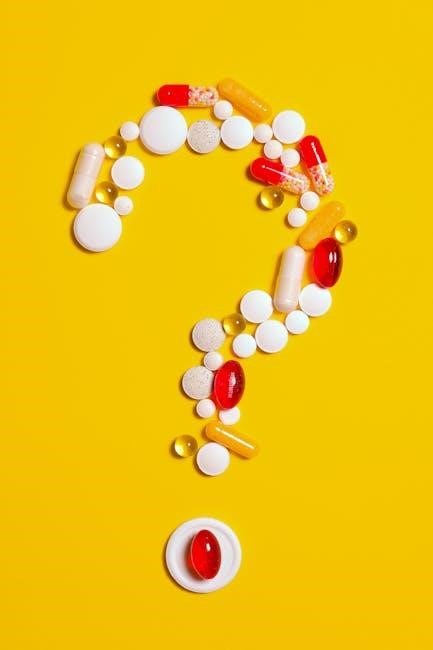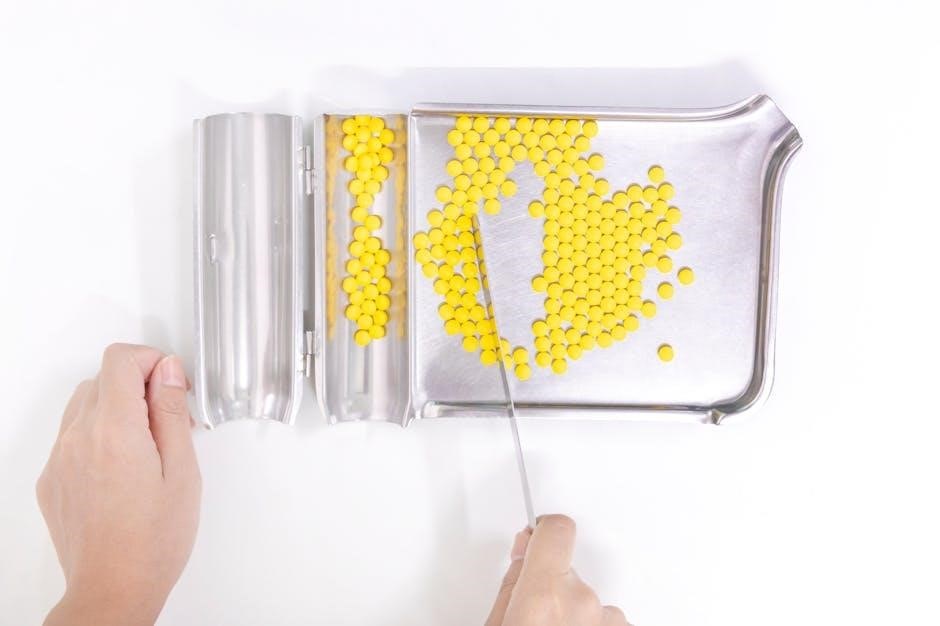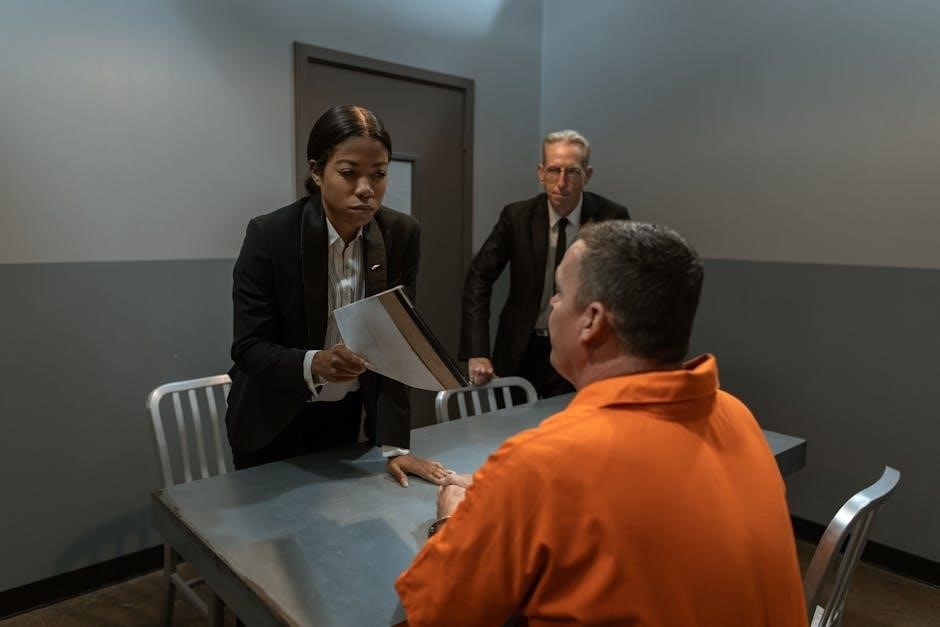Discover essential insights into pharmacy technician interviews with this comprehensive guide, featuring 41 common questions and sample answers to help you prepare effectively.
Importance of Preparation for Pharmacy Technician Interviews
Preparation is crucial for pharmacy technician interviews, as it helps candidates master common questions, showcasing their skills and knowledge confidently. By reviewing general, situational, and technical queries, individuals can stand out, demonstrating their readiness for the role and increasing their likelihood of success in a competitive job market.
Common Pharmacy Technician Interview Questions and Answers
This section provides a comprehensive list of 41 pharmacy technician interview questions, along with sample answers, to help job seekers prepare and respond confidently during interviews.
General Questions About Background and Experience
General questions focus on your background and experience, such as “Tell me about yourself” or “Why did you want to become a pharmacy technician?” Be prepared to discuss your education, training, and previous roles. For example, highlight your detail-oriented nature and passion for patient care. Emphasize your ability to work in fast-paced environments and interact with diverse populations professionally.
Situational and Behavioral Questions
Situational and behavioral questions assess how you handle real-life scenarios, such as handling difficult customers or managing conflicts. Be prepared to provide specific examples, like describing a time you provided excellent customer service or resolved a workplace issue. Use the STAR method (Situation, Task, Action, Result) to structure your responses clearly and effectively.
Technical Questions About Pharmacy Operations
Technical questions focus on your understanding of pharmacy processes, such as prescription filling, medication labeling, and inventory management. Examples include explaining the steps for verifying prescriptions or handling controlled substances. These questions test your knowledge of pharmacy protocols and attention to detail, ensuring you can perform tasks accurately and safely in a clinical or retail setting.
How to Prepare for a Pharmacy Technician Interview
Research the pharmacy, practice common questions, and review technical skills. Understand the job description and prepare examples of your experiences to demonstrate your qualifications effectively.
Researching the Pharmacy and Role
Researching the pharmacy and role is crucial for a successful interview. Understand the pharmacy’s mission, services, and work environment. Review their website, recent news, or patient reviews to gain insights. Tailor your answers to align with their specific needs and values, demonstrating how your skills and experiences match their expectations. This preparation shows initiative and genuine interest in the position.
Practicing Responses to Common Questions
Practicing responses to common pharmacy technician interview questions is vital for confidence and clarity. Review frequently asked questions, such as “Tell me about yourself” or “Why do you want to work here?” Use sample answers from reliable PDF guides to craft thoughtful responses. Focus on highlighting your skills, experiences, and alignment with the pharmacy’s values. Mock interviews can further refine your delivery, ensuring you feel prepared and articulate during the real interview.
Understanding the Pharmacy Technician Job Description
Understanding the pharmacy technician job description is key to acing your interview. Focus on responsibilities like filling prescriptions, managing inventory, and assisting pharmacists. Reviewing the job description helps you align your skills and experiences with the role, ensuring your answers demonstrate relevance and suitability. Highlighting your ability to perform core duties will showcase your preparedness and fit for the position effectively.

Behavioral Interview Questions for Pharmacy Technicians
Behavioral questions assess your problem-solving skills and teamwork abilities. They help employers understand how you handle real-life scenarios in a pharmacy setting and evaluate your fit for the role.
Examples of Behavioral Questions
Common behavioral questions include: “Tell me about a time you handled a difficult customer,” “Describe a situation where you worked as part of a team,” or “Share an instance where you resolved a conflict at work.” These questions help employers gauge your interpersonal skills and problem-solving abilities in real-life scenarios, ensuring you fit well within their team and can manage challenges effectively.
How to Use the STAR Method for Answers
The STAR method—Situation, Task, Action, Result—helps structure your responses to behavioral questions effectively. Describe the situation, outline the task you faced, explain the actions you took, and share the result. This method ensures clarity and highlights your problem-solving skills, making your answers memorable and aligned with the interviewer’s expectations for a pharmacy technician role.
Technical Skills and Knowledge for Pharmacy Technicians
Proficiency in prescription filling, medication labeling, and inventory management is crucial. Strong understanding of drug interactions and pharmacology ensures accurate dispensing and patient safety in pharmacy settings.
Understanding Prescription Filling Processes
Accurate interpretation of prescriptions is vital. Pharmacy technicians must verify drug names, dosages, and instructions, ensuring correct entry into the system. Proper handling of refills, transfers, and insurance claims is also essential. Attention to detail prevents errors, ensuring patient safety and compliance with legal standards in pharmacy operations.
Knowledge of Medications and Drug Interactions
Understanding medications, their classifications, and potential interactions is crucial. Pharmacy technicians must recognize common drug names, generic equivalents, and side effects. Awareness of contraindications and allergens ensures safe dispensing. Staying updated on new medications and guidelines through continuous learning and drug reference guides is essential for providing accurate patient care and minimizing adverse reactions.

Customer Service and Communication Skills
Effective communication and empathy are vital in pharmacy settings. Handling difficult customers with patience and providing clear, accurate information ensures positive patient interactions and trust in care.
Handling Difficult Customers
Handling difficult customers requires patience, empathy, and clear communication. Active listening helps de-escalate tense situations, ensuring patient concerns are addressed respectfully. Remaining calm and professional, even under pressure, builds trust and fosters positive interactions. Demonstrating understanding and providing solutions effectively resolves conflicts, enhancing overall customer satisfaction and maintaining a supportive environment.
Providing Clear and Accurate Information
Providing clear and accurate information is crucial for patient safety and trust. Pharmacy technicians must communicate medication instructions, dosage details, and potential side effects effectively. Ensuring patients understand their prescriptions, handling refill requests accurately, and addressing concerns with clarity fosters confidence and ensures proper medication use. This skill is essential for delivering high-quality patient care and maintaining professionalism.

Organizational and Time Management Skills
Organizational and time management skills are vital for pharmacy technicians to efficiently handle multiple tasks, prioritize duties, and maintain accuracy in a fast-paced environment.
Examples of Organizational Tasks in a Pharmacy
Organizational tasks include managing inventory, processing prescriptions efficiently, and maintaining patient records. Pharmacy technicians also organize workflows, prioritize tasks, and use tools like checklists or digital systems to ensure accuracy and timeliness in a fast-paced environment.
How to Demonstrate Efficiency in a Fast-Paced Environment
Hospital pharmacy technicians demonstrate efficiency by staying focused, prioritizing tasks, and utilizing tools like checklists or digital systems. They manage multiple responsibilities, such as processing prescriptions and handling patient queries, while maintaining accuracy. By streamlining workflows and minimizing distractions, technicians ensure timely service delivery and high-quality patient care, even in demanding environments.
Handling Challenging Situations in a Pharmacy
Pharmacy technicians effectively manage challenging situations by addressing customer concerns, resolving conflicts, and ensuring compliance with protocols, all while maintaining professionalism and patient trust.
Examples of Challenging Scenarios
Challenging scenarios include handling difficult customers, managing prescription refill requests before the appropriate period, or addressing suspicious coworker behavior. Demonstrating problem-solving skills, such as resolving conflicts professionally and ensuring compliance with pharmacy protocols, is crucial. These situations test a technician’s ability to remain calm, think critically, and maintain patient trust while adhering to regulations.
Problem-Solving Strategies for Pharmacy Technicians
Effective problem-solving involves staying calm, assessing situations objectively, and communicating clearly. Use the STAR method to structure responses, detailing how you identified, analyzed, and resolved issues. Examples include handling an angry customer by listening actively or addressing medication discrepancies by cross-verifying prescriptions. Emphasize proactive approaches, ensuring compliance with regulations and maintaining patient safety.
Career Development and Staying Updated in the Field
Continuous learning and certification are crucial for pharmacy technicians. Staying informed about new medications, regulations, and advancements ensures professional growth and adaptability in a dynamic healthcare environment.
Continuous Learning and Certification
Continuous learning is vital for pharmacy technicians to stay updated on new medications and regulations. Pursuing certifications, such as Certified Pharmacy Technician (CPhT), enhances skills and knowledge. Regular training and attending workshops ensure adherence to best practices and industry standards, fostering professional growth and adaptability in a rapidly evolving healthcare field.
Staying Informed About New Medications and Regulations
Staying informed about new medications and regulations is crucial for pharmacy technicians to ensure compliance and patient safety. Subscribing to industry newsletters, attending seminars, and participating in training programs helps professionals stay updated on drug approvals and legal changes, enabling them to provide accurate information and maintain high standards of care.
Red Flags to Avoid in a Pharmacy Technician Interview
Avoid appearing unprepared, lacking knowledge of pharmacy operations, or showing poor communication skills. Negative attitudes, inability to discuss weaknesses, or dishonesty about past roles can harm your chances.
Common Mistakes to Avoid
Avoid appearing unprepared or lacking knowledge of pharmacy operations. Poor communication, negative attitudes, and dishonesty about past roles are red flags. Not discussing weaknesses positively or failing to show enthusiasm for the role can also harm your chances. Ensure you research the pharmacy, practice answers, and present yourself professionally to avoid these pitfalls.
How to Present Weaknesses Positively
Frame weaknesses as opportunities for growth. For example, mention a skill you’re improving, like time management, and explain how you’re addressing it. Focus on self-awareness and proactive steps taken to overcome challenges. Avoid clichés like “perfectionism” and instead offer specific, honest examples that demonstrate your commitment to personal and professional development.
Body Language and First Impressions
Maintain positive body language by making eye contact, smiling, and standing tall. A firm handshake and professional attire also convey confidence and professionalism, making a strong first impression.
Non-Verbal Communication Tips
Non-verbal cues like maintaining eye contact, smiling, and using open gestures convey confidence and engagement. Avoid crossing arms or fidgeting, as these may signal nervousness. Good posture and attentive listening demonstrate professionalism and respect. These subtle actions can significantly enhance your first impression during the interview.
Dressing Professionally for the Interview
Dress professionally in business attire, such as a suit or blouse and slacks, ensuring clothes are clean and pressed. Avoid overly casual or flashy accessories. Pay attention to grooming, as a polished appearance demonstrates respect and professionalism. This helps create a positive first impression, showing you are serious about the pharmacy technician role and eager to succeed.
Follow-Up After the Interview
Send a thank-you note within 24 hours, expressing gratitude and reaffirming interest in the role. Follow up politely after one week if no feedback is received;
Writing a Thank-You Note
A thank-you note should be sent within 24 hours after the interview, expressing gratitude for the opportunity. Mention a key discussion point to show engagement and reiterate your interest in the role. Keep it concise, professional, and personalized to leave a positive impression on the interviewer.
When to Follow Up for Feedback
Follow up for feedback about one week after the interview if you haven’t heard back. Send a polite email to inquire about the status of your application and express your continued interest in the role. This demonstrates responsibility and enthusiasm, while also showing respect for the interviewer’s time and process.

Free Resources for Pharmacy Technician Interview Preparation
Access free PDF guides, websites, and practice tests to prepare for pharmacy technician interviews. These resources provide sample questions, answers, and tips to boost your confidence and readiness.
Recommended PDF Guides and Websites
Download free PDF guides and explore websites offering pharmacy technician interview questions and sample answers. These resources provide detailed insights, tips, and practice tests to help you prepare effectively. Popular options include comprehensive guides from ASHP and specialized websites like Pharmacy Technician Guide, ensuring you’re well-equipped for your interview with confidence and knowledge;
Practice Tests and Mock Interviews
Enhance your preparation with practice tests and mock interviews tailored for pharmacy technicians. These tools help assess your readiness, identify weak areas, and refine your responses. Use online platforms and PDF guides to simulate real interview scenarios, focusing on technical skills, behavioral questions, and time management to build confidence and ensure a polished performance.
